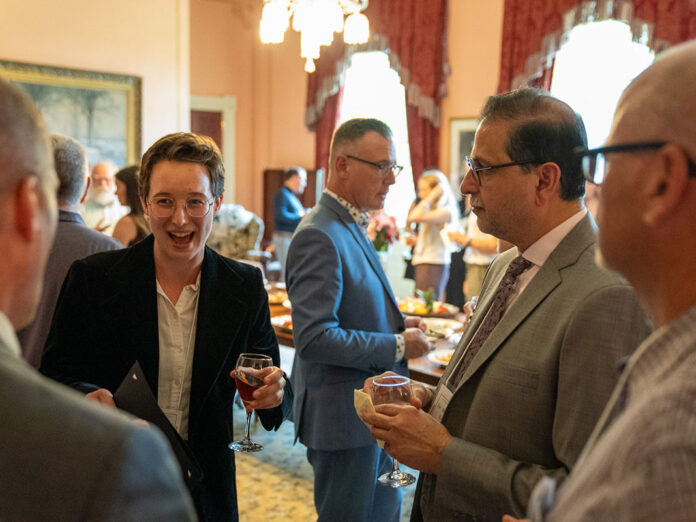
From Fredericton to Montreal, to Boston, St. Thomas University alum Abbie LeBlanc’s journey to Harvard was not all smiles and laughter.
For LeBlanc, studying at STU was not a tough decision. As a Frederictonian born and raised, she always had a passion for the liberal arts and knew what she wanted to do.
“I came in as a student knowing I wanted to do great books and moot court,” she said. “They lived up to the hype that I had built up for them in my mind,” she said.
LeBlanc graduated from STU in 2019, where she majored in great books, political science and human rights.
She recalled the great books course “Love and Friendship,” specifically reading Shakespeare’s play Twelfth Night and Judas Butler’s book Gender Trouble as an impactful moment at STU.
“That was like a formative experience,” she said. “Being able to see how great books across wildly different contexts that people maybe wouldn’t put them in, could speak to each other.”
The synthesizing of intriguing texts and delving deep into them with her professors was transformative for LeBlanc, but she said the ways in which great books professors Andrew Moore and Alan Hall interacted with students impacted her career choices even more.
“I kind of just wanted to be doing what they were doing, which is how I wound up going to grad school.”
She credits Moore, Matt Dinan and human rights professor Amanda DiPaolo for helping her apply to higher education, although she felt the desire to pursue an advanced degree early into her undergrad.
Her aspirations lead her to McGill, even though this wasn’t her initial plan.
She applied to a plethora of PhD programs after STU, but was rejected from all of them.
“It was devastating then to get rejected,” she said. “There’s no way you can really psychologically prepare yourself for what that’ll feel like to get six rejection letters in the span of two or three weeks.”
“As a student and just as a person, a little bit of rejection in life is good for you.”
Despite her post-grad hopes not going as planned, LeBlanc said going to McGill ended up being a great turn of events, especially since COVID-19 halted her in-person school experience just 5 months in, forcing her to move home.
Regardless of her short time in Montreal, LeBlanc loved the experience. Her favourite part? The public transportation.
“What I really love is the subway,” she said. “I dream of Fredericton someday being big enough that I could go home and take a subway.”
LeBlanc’s time with McGill ended in 2021 when she graduated with a master’s degree. From there, Harvard was the next destination — although, like her journey to McGill, this was not her initial plan.
Originally, she intended to stay in Canada to do her PhD, but applied more broadly after encouragement from her advisor Jacob Levy.
“My advisor gave me a list of like 12 schools to apply to. I was just like, ‘Sure, sounds great, boss,’ and that’s what I did.”
When she received the acceptance email from Harvard, the first thing she did was text her parents. However, she stopped replying as her work as a teacher’s assistant got in the way of her sharing the news.
“They were like, ‘You can’t just tell me you got into Harvard and then decline our calls, you’re already too big time to talk to us?’”
Currently, she is working on her dissertation and is a TA for Michael Sandel’s course “Justice,” which is viral on YouTube with over 38 million views.
However, despite having graduated from STU over five years ago, LeBlanc still reflects on her time in Fredericton and her professors – specifically Moore and Hall – thinking of them as role models that shaped the way she wants to approach being a professor herself.
In a video posted on Oct. 4 by STU Great Books Society on Instagram, Hall and Moore discussed the way they approach teaching. In the video, Moore says he “pursues uncertainty” and Hall references how jazz musician Miles Davis would intentionally play a wrong note during his solos, because “If [he] knows where this thing is going, it’s not going to be good.”
This ethos of teaching is something that LeBlanc said she aspires to replicate.
“Being able to do that is actually so, so difficult, as I’m learning right now,” she said. “But every single [professor] I had made that seem kind of effortless.”
“I realized how much I still have to learn,” she said.
